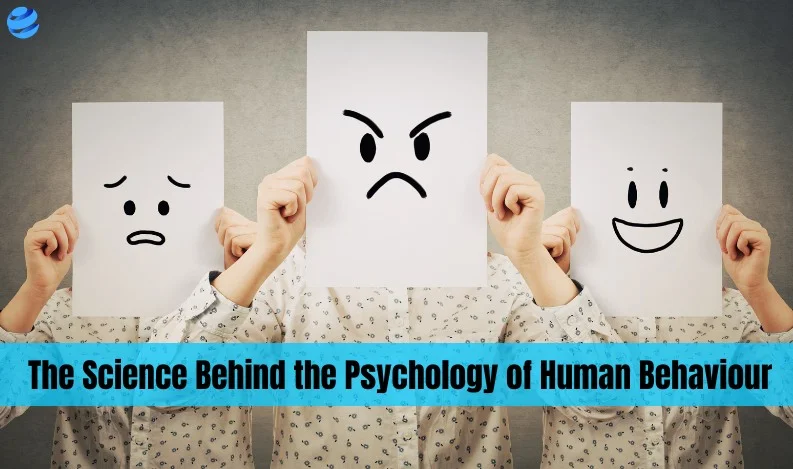Human behaviour is a complex and fascinating topic. Why do people act the way they do? What processes occur in the brain to influence decisions and actions? Understanding these questions requires delving into the field of psychology. This blog will explore the science behind human behaviour in simple language. We'll break down complex ideas into easy-to-understand sections, making it accessible even for young readers.
What is Psychology?
Psychology is the study of the mind and behaviour. It seeks to understand how people think, feel, and act. Psychologists study various aspects of the mind, including how we learn, remember, and solve problems. They also explore emotions, relationships, and the social factors that influence behaviour.
Branches of Psychology
Psychology is a broad field with several branches:
Clinical Psychology: Focuses on diagnosing and treating mental health disorders.
Developmental Psychology: Studies how people grow and change throughout their lives.
Cognitive Psychology: Examines mental processes like thinking, memory, and problem-solving.
Social Psychology: Investigates how people are influenced by others and their environment.
Biopsychology: Looks at how the brain and nervous system affect behaviour.
The Brain and Behaviour
The brain is the command centre of the body, controlling everything we do. It sends signals to different parts of the body, telling us how to act. The brain is made up of several parts, each with specific functions.
The Cerebrum
The cerebrum is the largest part of the brain. It is responsible for higher brain functions, including thought, learning, and memory. It is divided into two hemispheres, the left and the right, each controlling different functions and opposite sides of the body.
The Cerebellum
The cerebellum is located at the back of the brain. It helps with balance and coordination. When you ride a bike or play a sport, your cerebellum is hard at work, helping you maintain balance and perform movements smoothly.
The Limbic System
The limbic system is deep inside the brain. It controls our emotions and motivations. The limbic system includes structures like the amygdala and the hippocampus. The amygdala is involved in processing emotions like fear and pleasure, while the hippocampus is crucial for forming new memories.
The Brainstem
The brainstem connects the brain to the spinal cord. It controls basic life functions such as breathing, heartbeat, and digestion. Without the brainstem, we wouldn't be able to survive.
How We Learn
Learning is a fundamental aspect of human behaviour. From the moment we are born, we start learning about the world around us. Learning helps us adapt and thrive. The brain plays a key role in how we learn and remember information.
Observational Learning
One of the ways we learn is by observing others. This is called observational learning. Children, for example, learn to speak by listening to their parents and imitating them. Observational learning is a powerful tool. It allows us to learn without direct experience.
Practice and Repetition
Practice and repetition are essential for learning new skills. The more we practise, the better we become. This is because our brain forms new connections when we practise. These connections, known as neural pathways, help us remember and perform tasks more efficiently.
Reinforcement
Reinforcement is another important aspect of learning. It involves rewarding or punishing behaviour to encourage or discourage it. Positive reinforcement, such as praise or rewards, encourages good behaviour. Negative reinforcement, such as removing an unpleasant stimulus, can also shape behaviour.
Emotions and Behaviour
Emotions play a significant role in how we behave. They influence our decisions, actions, and interactions with others. Understanding emotions helps us better manage our behaviour.
Positive Emotions
Positive emotions, such as happiness, love, and excitement, make us feel good. They motivate us to pursue activities that bring joy and fulfilment. Positive emotions also enhance our ability to think creatively and solve problems.
Negative Emotions
Negative emotions, such as anger, fear, and sadness, can be challenging. They can cause stress and lead to behaviours that we might later regret. However, negative emotions also serve important functions. Fear, for example, can protect us from danger by prompting us to avoid risky situations.
Managing Emotions
Learning to manage emotions is crucial for healthy behaviour. Techniques such as deep breathing, mindfulness, and talking about feelings can help us cope with negative emotions. Developing emotional intelligence allows us to understand and respond to our own emotions and those of others.
Social Influence
Humans are social creatures. Our behaviour is often influenced by the people around us. This is known as social influence. It can come from family, friends, and society as a whole.
Family and Friends
Our family and friends have a big impact on our behaviour. They teach us how to act and support us during difficult times. From a young age, we learn social norms and values from our family. Friends also influence our behaviour, especially during adolescence.
Society and Culture
Society and culture shape our behaviour in many ways. Different cultures have different rules and traditions. These cultural norms guide how we act and interact with others. For example, in some cultures, it is customary to greet people with a handshake, while in others, a bow is more appropriate.
Peer Pressure
Peer pressure is a type of social influence where individuals feel pressured to conform to the behaviour of their peers. This can be positive or negative. Positive peer pressure can encourage good behaviour, such as studying hard or participating in healthy activities. Negative peer pressure can lead to harmful behaviours, such as smoking or cheating.
Making Decisions
Decision-making is a complex process that involves thinking, feeling, and sometimes seeking advice from others. Our brains work hard to weigh the pros and cons of different options.
Logical Thinking
Logical thinking involves using reason and facts to make decisions. It requires analysing information, considering different outcomes, and choosing the best option. Logical thinking helps us make informed and rational choices.
Emotions and Decisions
Emotions also play a role in decision-making. Sometimes, our feelings guide us more than logic. For example, we might choose to spend time with friends instead of studying because it makes us feel happy. While emotions can lead to good decisions, it’s important to balance them with logic.
Intuition
Intuition is another factor in decision-making. It’s a gut feeling or instinct that guides us. Intuition is based on our experiences and knowledge. It helps us make quick decisions, especially in situations where we don’t have all the information.
Behavioural Theories
Several theories explain human behaviour. These theories help us understand why people act the way they do. Let’s look at some of the main behavioural theories.
Behaviourism
Behaviourism focuses on observable behaviour. It suggests that all behaviour is learned from the environment. According to behaviourism, rewards and punishments shape our actions. For example, if a child is rewarded for doing homework, they are likely to continue doing it.
Cognitive Theory
Cognitive theory looks at how we think. It suggests that our thoughts influence our behaviour. Positive thinking leads to positive actions. For example, if we believe we can succeed, we are more likely to work hard and achieve our goals.
Humanistic Theory
Humanistic theory focuses on personal growth and self-fulfilment. It suggests that people are naturally good and strive to reach their full potential. According to this theory, understanding our feelings and needs helps us become our best selves.
Psychodynamic Theory
Psychodynamic theory, developed by Sigmund Freud, focuses on the unconscious mind. It suggests that our behaviour is influenced by unconscious thoughts, desires, and memories. This theory also emphasises the importance of early childhood experiences in shaping behaviour.
Importance of Understanding Behaviour
Understanding human behaviour is crucial for several reasons. It helps us improve our lives, build better relationships, and solve problems.
Better Relationships
When we understand why people act the way they do, we can communicate better. This leads to stronger and happier relationships. For example, understanding that someone is upset because they had a bad day helps us respond with empathy and support.
Problem-Solving
Understanding behaviour helps us solve problems. It helps us find the root cause of issues. For example, if a student is not performing well in school, understanding their behaviour can help identify the problem, such as a lack of motivation or difficulty with the subject matter.
Personal Growth
Understanding our own behaviour helps us grow and improve. It allows us to identify areas where we can make positive changes. For example, recognising that stress is affecting our behaviour can prompt us to find healthier ways to cope with it.
Applying Psychology in Everyday Life

Psychology is not just for scientists and therapists. It can be applied in everyday life to improve our well-being and interactions with others.
In Education
Teachers use psychological principles to enhance learning. Understanding how students learn helps teachers create effective teaching strategies. For example, using positive reinforcement encourages good behaviour and academic performance.
In the Workplace
Employers use psychology to improve productivity and employee satisfaction. Understanding what motivates employees helps create a positive work environment. For example, recognising the importance of work-life balance can lead to policies that support employee well-being.
In Health
Psychology plays a role in promoting healthy behaviours. Understanding the psychological factors that influence health choices helps in designing effective health interventions. For example, campaigns that encourage exercise and healthy eating use psychological principles to motivate people.
In Personal Relationships
Applying psychological principles helps improve personal relationships. Understanding communication styles and emotional needs strengthens bonds. For example, active listening and empathy enhance relationships with family and friends.
Conclusion
The science behind human behaviour is complex and fascinating. Our brains, emotions, and social influences shape our actions. Understanding these factors helps us live better lives. It helps us build strong relationships and make good decisions. By studying psychology, we learn more about ourselves and others.
You may also like:-
Innovative Marketing Strategies for Small Businesses
The Intersection of Physics and Technology in the Modern World
The Mysteries of Deep-Sea Ecosystems and Marine Biology























